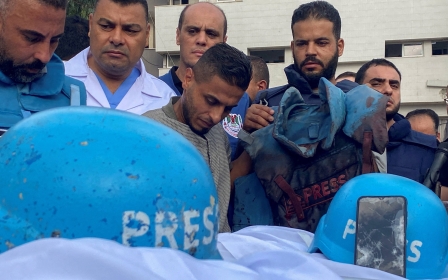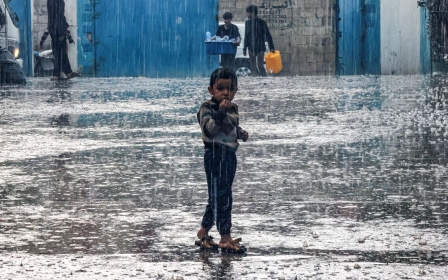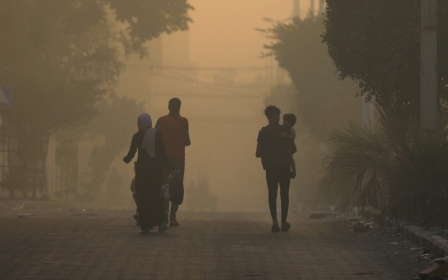Israel-Palestine war: The nightmare for a family buried under rubble in Gaza
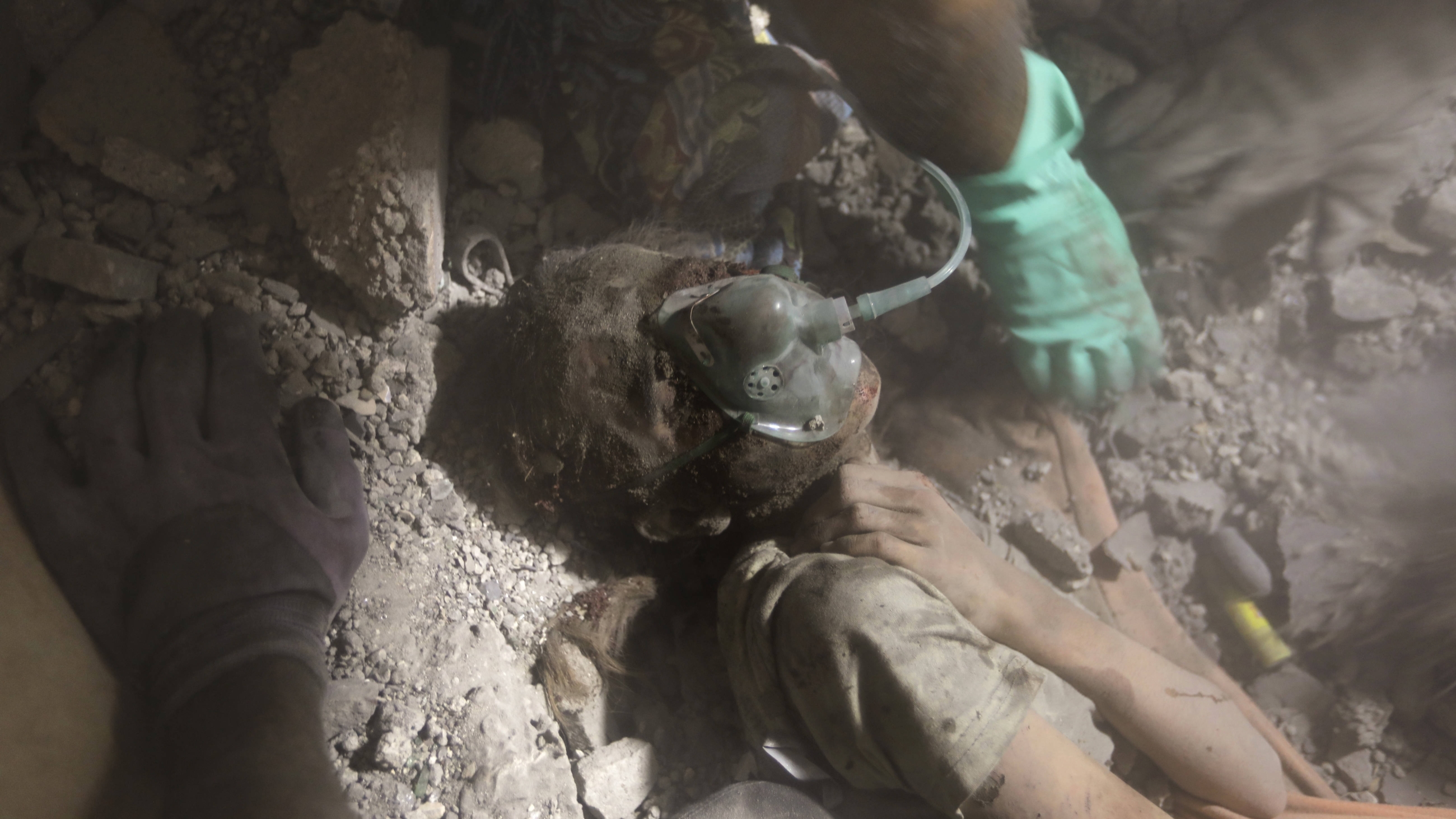
In the blink of an eye, the early morning light that had filled the rooms of Waheed Mousa's home was smothered by a mountain of rubble, burying him, his wife and his son.
"I woke up terrified. I found more than two-thirds of my body buried under the rubble. I thought it was our house that had been targeted. For a moment, I thought I was in a grave," Waheed, 55, told Middle East Eye.
An air strike had hit the house next door, but the powerful aftershock of the bombing caused major destruction to the residential building in al-Maghazi refugee camp, housing 36 residents, including Waheed's family, in addition to 35 displaced people.
Waheed, a laboratory manager, had hoped that his home - in an area in the central Gaza Strip classified as "safe" by the Israeli military - would be spared the brutal bombing campaign that has flattened whole neighbourhoods and killed over 11,200 people.
"The first thing I thought about was my wife and children. I was terrified of losing them, until I heard the voice of my wife Reem calling me in a painful voice: 'Waheed'. At this moment, I felt hopeful that she was still alive," he said.
New MEE newsletter: Jerusalem Dispatch
Sign up to get the latest insights and analysis on Israel-Palestine, alongside Turkey Unpacked and other MEE newsletters
Reem can't find the words to describe how she felt while she was buried under the rubble.
"I was very terrified, until I heard the voice of my youngest son, Ahmed, who is 13 years old, screaming and saying: 'Mama, I am suffocating,'" she said.
Reem had been texting her sister to check on her situation, when suddenly, she said, everything became black, ashes, and destruction.
"It was like a nightmare," she recalled.
Reem's entire body was trapped under stones and sand, except for her head, and when she heard her youngest son screaming, she tried to release herself, but wasn't able to move.
'I dream of bombing'
In those moments, Waheed said, the family had gone from consciousness to complete darkness.
"Everything around us was pitch black. We couldn't see anything, just voices moaning in pain and children crying," he said.
Follow Middle East Eye's live coverage of the Israel-Palestine war
"I thought that I would remain under the rubble and that no one would be able to rescue me. We lived in a four-storey building, and I thought it was directly bombed and levelled to the ground, which would make it very difficult to rescue us.
"I was terrified that I would lose all my family members, as has happened to many people in Gaza. I began to think that I would not be able to live alone."
Minutes later, however, neighbours came to rescue Waheed and his family from under the rubble. Waheed said that when he heard the voice of his eldest son, Mohammed, calling him, he felt a little safe.
The men began to remove sand and debris from the bodies of Waheed, Reem and Ahmed, who had been sleeping in the room that had sustained the most damage.
'I was terrified I would lose all my family members, as has happened to many people in Gaza. I began to think that I would not be able to live alone'
- Waheed Mousa
All three suffered deep wounds across their bodies, with Waheed sustaining fractures to the right side of his back and to his spine.
"I asked Mohammed, ‘How are your sisters? Where are they?’ He replied, ‘They are fine,’" Waheed recalls.
"I didn't believe they were fine until I saw them with my own eyes after I left the hospital."
Reem was keen to continue speaking to her youngest son, to prevent him from losing consciousness until they pulled him out from under the rubble.
Before the current war, Ahmed had already been suffering from panic and anxiety since Israel's aggression on the Gaza Strip in 2014, when he was four years old.
Being buried under rubble, his mother said, has worsened his psychological state.
"Even now, days after the incident, we find him waking up at night, terrified and running through the house towards the door as if he is escaping," Reem said.
Ahmed said, "I dream of bombing every night, and I cannot sleep peacefully because of the sound of planes, missiles, and artillery shells."
'It can never be forgotten'
The couple's five daughters had been sleeping in one of the corridors when everything went black.
"We heard the sound of stones falling. I turned on my phone's flashlight, and found my hands stained with blood," Walaa, 22, said.
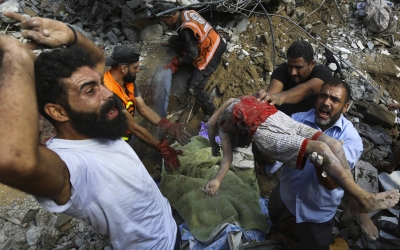
"When I put my hands on my face, they became more bloody. I didn't know where my wound was; I was terrified and asking about my father and mother."
In addition to the horror that the family had experienced, they also suffered significant financial losses.
"My house was severely damaged and will require around $15,000 to repair. My jeep, with an estimated value of $20,000, was completely destroyed. The laboratory I own next to the house also suffered damage valued at $1,500," he said.
All the flats in the building were severely damaged in the attack on 3 November, which killed 10 people in the neighbouring building.
The entire street and several shops were also damaged, as the densely populated al-Maghazi camp sits in an area of no more than 0.6 square kilometres.
A restaurant in the area was destroyed and its owner killed during the bombing.
Waheed said it was a miracle the family has survived.
"We saw death with our own eyes. Although every person in Gaza feels targeted, even if they are civilians, going through the experience of being trapped under the rubble can never be forgotten," he said.
This article is available in French on Middle East Eye French edition.
Middle East Eye delivers independent and unrivalled coverage and analysis of the Middle East, North Africa and beyond. To learn more about republishing this content and the associated fees, please fill out this form. More about MEE can be found here.


